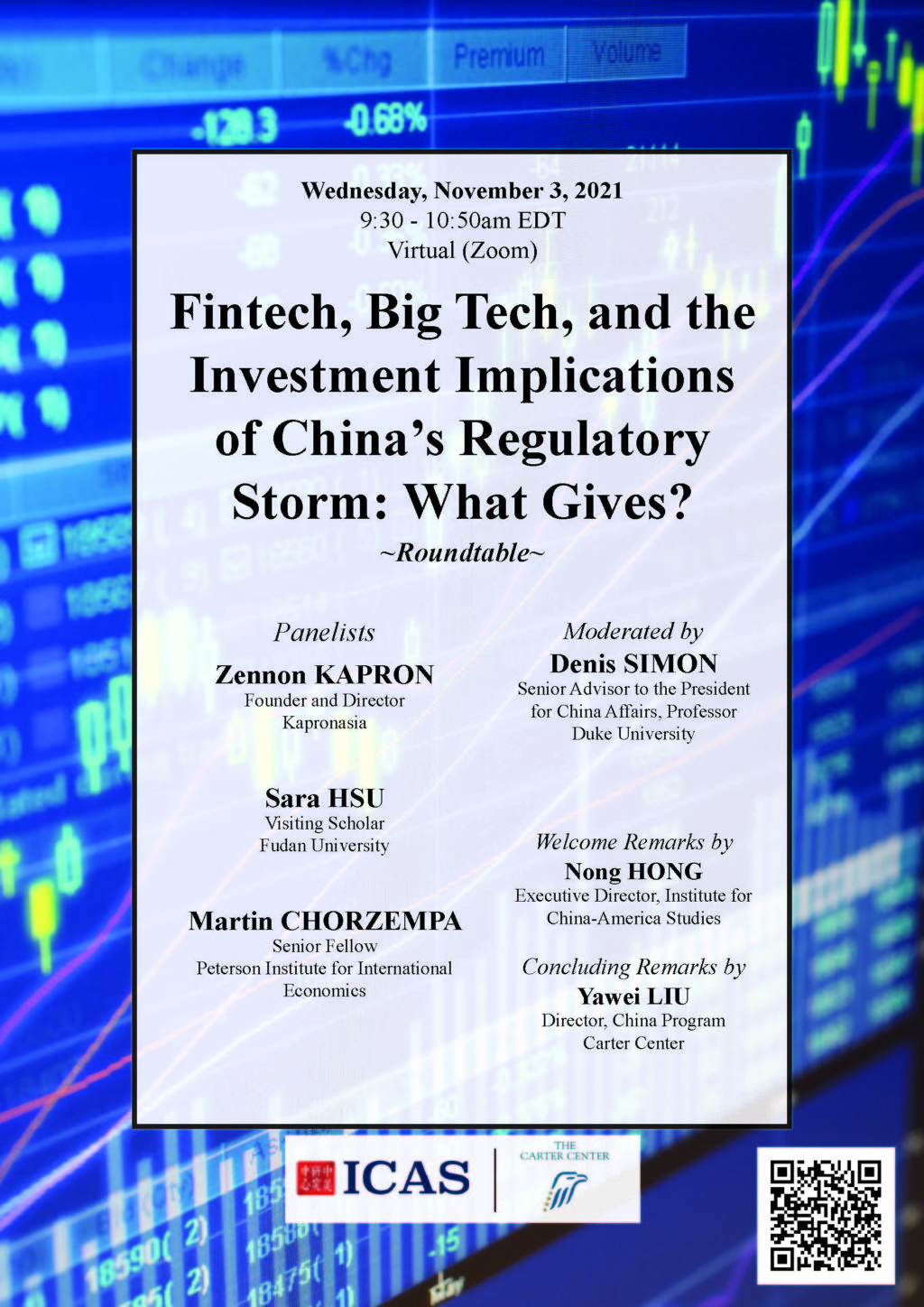EVENT SUMMARY
On November 3, 2021, the Institute for China-America Studies (ICAS) and the Carter Center China Program hosted a virtual public event to discuss the motivations behind China’s regulatory clampdown on Big Tech over the past twelve months. The event was titled “Fintech, Big Tech, and the Investment Implications of China’s Regulatory Storm: What Gives?” Dr. Hong Nong, Executive Director and Senior Fellow at ICAS, delivered the opening remarks, speaking to the heightened activity on technology regulation in China as well as re-publicizing the launch of ICAS’ newest program – the ICAS Trade ’n Technology (TnT) Program. The discussion was moderated by Dr. Denis Simon, Senior Advisor to the President for China Affairs at Duke University and a Senior Advisor to ICAS’ TnT Program, and featured three speakers: Mr. Zennon Kapron, Founder and Director, Kapronasia; Dr. Sara Hsu, Visiting Scholar, Fudan University; and Mr. Martin Chorzempa, Senior Fellow, Peterson Institute for international Economics.
The panelists expressed various perspectives on China’s new laws, regulations, and guidelines to bring its dynamic and flamboyant Big Tech sector to heel, starting with the November 2020 suspension of Ant Group’s IPO. The motivations for the clampdown stem from a variety of considerations, ranging from protecting financial system stability to instilling better data management practices to cracking down on anti-competitive practices to bureaucratic turf warfare to guaranteeing national security as well as the primacy of the Party and its control mechanisms. With Big Tech in China having outgrown its ‘sandbox’ age, the ‘Wild West’ era of light regulation too has given way to a new era of potentially stringent rules and regulations. The continuing frigidity in U.S.-China political ties has accelerated Beijing’s emphasis on strengthening data protection and the security of network products and services linked to the cross-border flow of data. In the context of these developments, panelists also discussed the implications of the regulatory clampdown on tech sector innovation in China as well as the potential delisting of Chinese companies from U.S. stock exchanges for failure to abide by data-linked audit disclosure requirements.
One theme was constant in the discussion: the unpredictability of the Chinese state as it goes about reining-in its ‘Wild West’ tech sector. Much like China’s four decade-long reform program had exhibited a persistent focus on experimentation – a ‘crossing the river by feeling the stones’ approach – so also the new era of reform and opening up is expected to feature a wide berth for malleable adaptation and the lack of a definitive strategy, including on the regulatory front. With an important Party Congress on the horizon furthermore, the new emphasis on Big Tech regulation is also the necessary glue of support needed by President Xi Jinping to justify and implement his overarching “Common Prosperity” agenda. The extent of damage to China’s cutting-edge industries that is inflicted by the unpredictability of this political and technocratic approach to regulation remains to be seen, however.

EVENT DESCRIPTION
As U.S-China relations have broken down, the Chinese state has rushed through stringent new laws and guidelines to deter monopolistic behavior as well as strengthen data protection and the security of network products and services linked to the cross-border flow of data. The zeal to limit foreign listing of key information infrastructure and core data from being maliciously exploited by an adversary is matched by an equal determination within the Beltway to shield the sensitive personal data of Americans from questionably transparent Chinese bidders as well as delist Chinese companies from major U.S. stock exchanges for a host of reasons ranging from national security risk to their failure to abide by standard audit disclosure requirements. As data and capital markets across the Pacific decouple, a number of high-profile Chinese companies, as well as American investors, have been caught in the crossfire.
In the context of these fast-moving developments, the event will discuss (a) the heady innovation in the fintech space in China and Asia, (b) the motivating factors behind the regulatory storm unleashed by the Chinese Communist Party on its home-grown Big Tech pioneers, (c) the investment implications of these stark Chinese technology regulations for American investors, and (d) the depth of sentiment against China on Capitol Hill as U.S. agencies set about bringing Chinese companies to heel on complying with U.S. legislative and regulatory requirements.
WELCOMING REMARKS
Dr. Nong HONG
Executive Director, Institute for China-America Studies
PANELISTS
Zennon KAPRON
Founder and Director, Kapronasia
Sara HSU
Visiting Scholar, Fudan University
Martin CHORZEMPA
Senior Fellow, Peterson Institute for International Economics
MODERATOR
Denis SIMON
Senior Advisor to the President for China Affairs, Professor
Duke University


